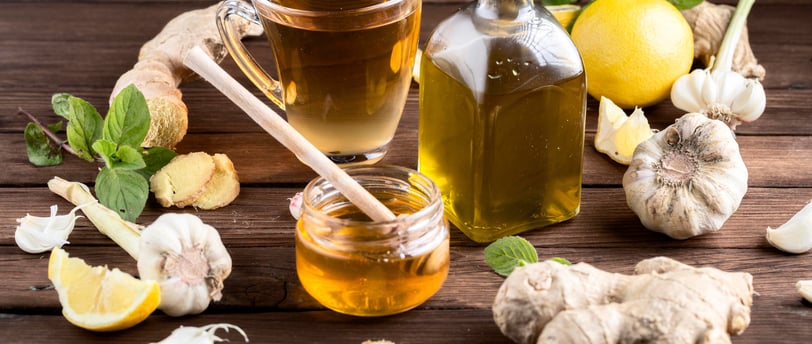Ginger medicinal plants properties
Ginger, scientifically known as Zingiber officinale, is a versatile and aromatic plant that has been used for centuries for its medicinal properties
Alexandre YOUTA
11/29/20234 min read


Ginger: Unveiling the Medicinal Properties of a Remarkable Plant
Ginger, scientifically known as Zingiber officinale, is a versatile and aromatic plant used for centuries for its medicinal properties. Originating from Southeast Asia, ginger is a popular spice in culinary dishes and a renowned natural remedy for various health conditions. In this article, we will explore the medicinal properties of ginger and how it can enhance your overall well-being.
Historical Use of Ginger
The use of ginger dates back thousands of years, with its origins traced to ancient China and India. It has been an integral part of traditional medicine systems, such as Ayurveda and Traditional Chinese Medicine, for its therapeutic benefits. Ginger was used to treat digestive disorders, alleviate pain, reduce inflammation, and boost the immune system. It was also valued for its warming properties and ability to promote overall health and vitality.
Chemical Composition of Ginger
The key bioactive compounds responsible for ginger's medicinal properties are gingerols and shogaols. These compounds give ginger its distinctive flavour and aroma. Gingerols have potent anti-inflammatory and antioxidant effects, while shogaols contribute to ginger's warming properties. Ginger contains essential oils, vitamins, minerals, and fibre, making it a nutrient-rich plant.
Health Benefits of Ginger
Digestive Health
Ginger is widely recognized for its beneficial effects on digestive health. It aids digestion by stimulating the production of digestive enzymes, promoting the absorption of nutrients, and reducing gastrointestinal discomfort. Ginger can help alleviate symptoms of indigestion, bloating, and stomach cramps. It also has carminative properties, which can help relieve gas and flatulence.
Anti-inflammatory Properties
Ginger possesses potent anti-inflammatory properties that can help reduce inflammation in the body. Chronic inflammation is associated with various health conditions, including arthritis, heart disease, and certain types of cancer. The gingerols in ginger inhibit the production of inflammatory molecules, thereby reducing inflammation and its associated symptoms.
Immune System Boost
Ginger has immune-boosting properties that can help strengthen the body's defence against infections and diseases. It contains antioxidants that protect the immune cells from oxidative damage and enhance their function. Regular consumption of ginger can help support a healthy immune system and reduce the risk of common illnesses.
Nausea and Motion Sickness Relief
Ginger has long been a natural remedy for nausea and motion sickness. It can help alleviate symptoms of nausea, vomiting, and dizziness associated with morning sickness, chemotherapy-induced nausea, and motion sickness. Ginger works by soothing the stomach and reducing the activity of the nausea-inducing neurotransmitters in the brain.
Pain Relief
Ginger has analgesic properties that can help alleviate pain and reduce inflammation. It relieves muscle and joint pain associated with arthritis, menstrual cramps, and exercise-induced soreness. Regular ginger or topical application of ginger oil can provide natural pain relief without the side effects of conventional pain medications.
Respiratory Health
Ginger has been traditionally used to support respiratory health. It can help relieve congestion, soothe sore throat, and reduce coughing. Ginger's warming properties help to loosen mucus and promote expectoration, making it beneficial for respiratory conditions such as colds, flu, and bronchitis.
Heart Health
Studies have shown that ginger may have beneficial effects on heart health. It can help lower blood pressure, reduce cholesterol levels, and prevent the formation of blood clots. These effects contribute to a lower risk of heart disease and stroke. Ginger's anti-inflammatory properties also help protect the cardiovascular system from inflammation-related damage.
Anti-cancer Properties
Research suggests that ginger may have anti-cancer properties. The gingerols and other bioactive compounds in ginger have been found to inhibit the growth of cancer cells and induce apoptosis (cell death) in various types of cancer. Ginger may also help reduce the side effects of cancer treatments, such as chemotherapy and radiation therapy.
Weight Management
Ginger can aid in weight management by boosting metabolism and reducing appetite. It helps increase calorie expenditure and fat oxidation, which can contribute to weight loss. Ginger also has a thermogenic effect, which generates heat in the body, further enhancing metabolism and fat burning.
Skin Health
Ginger's antioxidant and anti-inflammatory properties make it beneficial for skin health. It can help reduce inflammation, soothe skin irritations, and promote a healthy complexion. Ginger's warming properties also improve blood circulation, which can enhance skin radiance and increase the delivery of nutrients to the skin cells.
How to Incorporate Ginger into Your Diet
There are various ways to incorporate ginger into your diet and enjoy its health benefits. For a zesty and aromatic flavour, you can add fresh ginger to your cooking, such as stir-fries, soups, curries, and marinades. Ginger can also be used to make ginger tea, which can be enjoyed hot or cold. Additionally, ginger supplements are available for those who prefer a more concentrated form.
Precautions and Side Effects of Ginger
While ginger is generally safe for most people when consumed in moderation, it may cause side effects in some individuals. High doses of ginger or prolonged use may cause gastrointestinal issues such as heartburn, stomach upset, or diarrhoea. Ginger may also interact with certain medications, including blood thinners and diabetes medications. It is advisable to consult with a healthcare professional before starting any new supplements or if you have any underlying health conditions.
Conclusion
Ginger is a remarkable plant with a wide range of medicinal properties. From its digestive benefits and anti-inflammatory effects to its immune-boosting and pain-relieving properties, ginger can be a valuable addition to your daily routine. Whether you incorporate it into your cooking or opt for ginger supplements, harnessing the power of this versatile plant can contribute to your overall health and well-being.
Alexandre YOUTA
